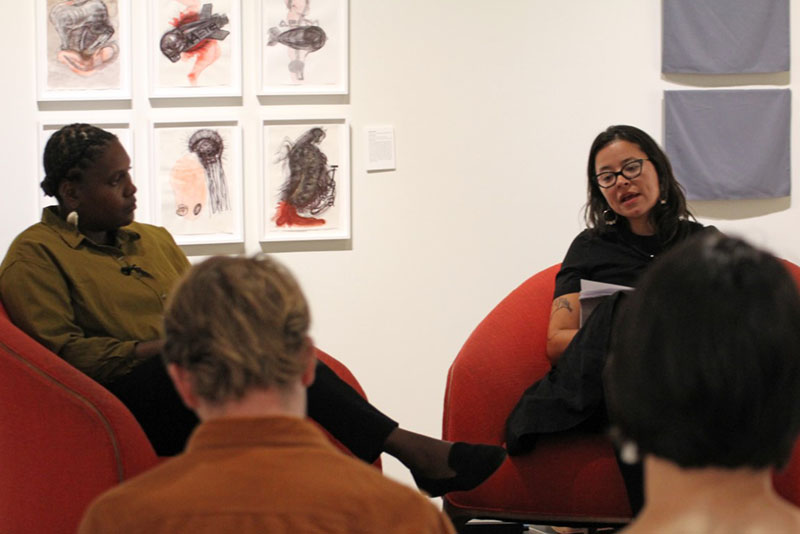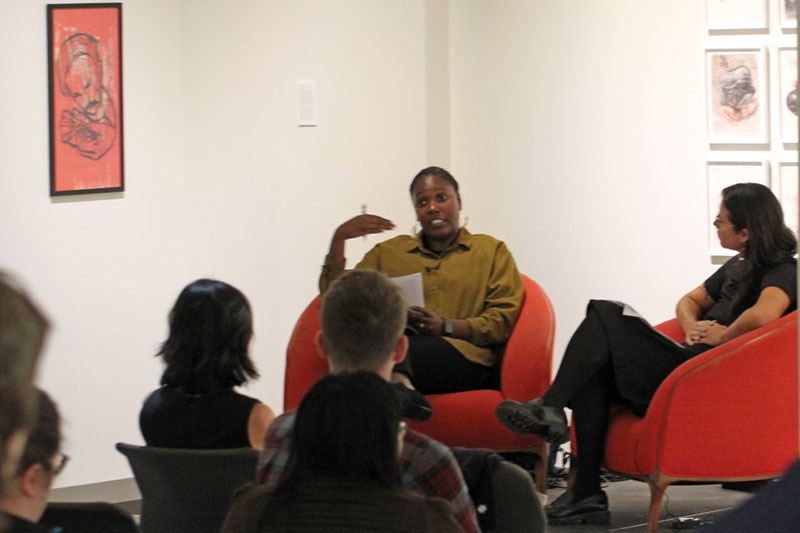- Apply
- Visit
- Request Info
- Give
Art Gallery panel discusses women’s experience with political violence
Written by Noel Teter
Published on October 18, 2022

The Art Gallery at Eastern Connecticut State University hosted a panel discussion on Oct. 12 as part of its “Women at War” exhibition. The discussion was facilitated by Maiyah Gamble-Rivers, assistant director of Student Affairs at the School Museum of Fine Arts at Tufts University and featured artist, educator, photographer and community organizer Luciana Quagliato McClure.
Topics included activism, women’s experience during times of political violence, trauma, displacement and the fight for basic rights. Gamble-Rivers framed the discussion as a “meaningful conversation about women and war” to complement the current exhibition, which features a selection of Ukrainian women artists whose work references the war with Russia.
Quagliato McClure drew upon personal experience with the goal of promoting activism. Born and raised in Brazil, a country repressive of women’s rights, she lacked a platform upon which to build her argument for awareness of the turmoil of women during wartime. “Silence is not an option,” she emphasized.
Action against oppression is essential for Quagliato McClure. Throughout her discussion, she asked several rhetorical questions such as “what does it feel like to not have time to think and only have time to act?” These questions served to place attendees in the shoes of others without the luxury of privilege.

Maiyah Gamble-Rivers speaks at the panel discussion.
She emphasized not only action but acting together. “Women are strong, and once they get together, they can change anything,” she asserted. She applied this rhetoric to mothers in tumultuous times, such as the repression of women’s rights stemming from the overturning of Roe v. Wade. “I think we should sit, we should mourn, but we should also fight,” she claimed.
The discussion turned to trauma in the context of political violence. “When I think of violence and trauma, I think of the body,” stated Quagliato McClure, adding that “trauma separates us from the body.” Gamble-Rivers added that trauma-inducing violence should be taken seriously: “When I think about trauma and violence, it creates a sense of urgency.”
The topic of displacement prompted Quagliato McClure to discuss her homeland, and what defines home for her now. “I don’t think of Brazil as my home,” she claimed, adding that she felt no sense of community in São Paulo, where she grew up. Now living in New Haven, she said that to her, home is where community is. “I can walk onto the street and see someone I know,” she said of her current life.
This sense of community first occurred to her in 2016, when she launched an art exhibition in New Haven for the Nasty Women movement. More than 300 artists contributed their work, and “the city stopped” as more than 1,000 people went to the opening reception, causing traffic backups. This provided Quagliato McClure the sense of community she had previously lacked.
This exhibition was not something she could have launched in Brazil. She stated that in Brazil, one would“just disappear” if they tried to protest in the name of women’s activism. Conversely, in the United States, she has protested many times. On this experience, she stated, “at no point have I actually felt unsafe.” Now, she is free to work and express herself as she pleases, which she believes should be advocated for across the world. She referred to struggles for rights as wars, emphasizing awareness of wars in other countries while continuing to live autonomously.


